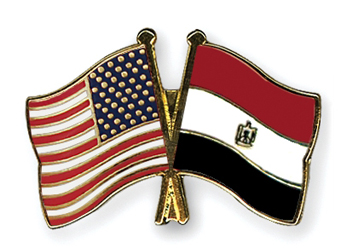I watched President Abdel Fattah al-Sisi’s address at the United Nations last week from the DMC TV studios in Cairo. Along with Dalia Youssef, a member of the Egyptian parliament; Mamhoud al-Said, former ambassador and assistant foreign minister; and Ahmed Abou Ali, vice president of the AmCham Egypt, I was a guest of Ossama Kamal’s, a well-known television anchor in the country.
In my view, the address served to reassert Sisi’s leadership on the global stage and was an indication of Egypt’s return to a regional and international role after an exasperated period of revolts and political and economic instability.
In his address, Sisi rightly highlighted that Africa is not only “at the heart of Egypt’s foreign policy” and where “[our] historic roots lie,” but considering the free tax agreement Egypt has with the continent, it is also an appealing destination for Egyptian businesses.
He was correct to contrast the security threats in Africa as similar to the ones faced in the Arab world. In Egypt’s uncompromised fight against terrorism and efforts to eradicate terrorist groups in Sinai and those that daily attempt to infiltrate to Egypt from Libya, Sisi talked about the need to eliminate its root cause, but not only through military means. Egypt could swiftly emerge as an example of bold religious reforms, which Sisi launched with the Grand Mufti of Egypt and Al Azhar, one of the world oldest Islamic University based in Cairo.
The effort includes newly established communication channels of Islamic authorities in Egypt with the young generation through social media, and Dar-el-Ifta (the Egyptian State-run Islamic Institution) now has over 6,200,000 followers. The institution has established offices in 35 countries, where it regularly monitors websites and mosque prayers in order to identify those who interpret the Quran in ways that incite violence and encourage Islamic radicalism. Dar el-Ifta also opened phone lines to promptly communicate with people who provide religious guidelines in moderate interpretations of the Islamic teachings. They observe international and local religious preaching in mosques and engage with those who misinterpret the Muslim Holy Book in radical ways.
Elements of the banned Muslim Brotherhood in Egypt are trying to undermine the religious reforms by calling Sisi a secular detached from Islam — which is certainly not the case — but Egyptians are seeing through the fog and lies of the Muslim Brotherhood and it is unlikely that they will ever be tricked again. Muslim Brotherhood efforts — mostly through social media — to instigate sectarian division between Egyptian Muslims and Christians have been unsuccessful and clearly show the true nature of their organization.
At the U.N., Sisi also talked about the importance of empowering youth through the economic reforms Egypt has undertaken. In creating a “new Egypt,” education reform is perhaps the most fundamental, and this is a field where Egypt faces many challenges: From the need to modify school curricula, reduce the number of teachers (from 1,350,000 to an optimum of 850,000), restructure classroom structures (where now up to 70 students share one classroom), and train teachers so that they uphold high educational standards.
Egyptian thinkers and politicians are keen to open more channels of communication to improve mutual understanding and cooperation. The warm relationship between U.S. President Trump and Egyptian President al-Sisi is important, but people-to-people connections are vital and must be improved significantly. For example, it took nine years for an Egyptian parliamentarian delegation to visit Washington D.C., which happened last June. A dire lack of such communications created serious gaps that need to be bridged. This burden cannot only rest on Shafik Gabr, a brilliant example of a true visionary and beacon of the people-to-people ties between the U.S. and Egypt through youth exchange programs and fellowships within his “East – West Dialogue” foundation.
Egypt needs a strong partner in the United States. The country is going through difficult structural reforms to modernize and balance its economy, while still healing from the destructive legacy created by Morsi’s Muslim Brotherhood, along with fighting terrorism and keeping its citizens safe. The country is managing to bring its foreign policy back on its feet, but with respect to diplomacy and overall reforms, it will take time to move ahead from “Nasserism” and the outdated socialist political mentality.
We need to understand this and reassure the Egyptian society that we stand together in this journey. Criticism from the U.S., especially on human rights issues, is important and healthy. After all, Sisi himself acknowledged that there are issues in this respect and that Egypt is addressing them in manner and ways that will not hamper security efforts to bring lasting stability. This is vital not only for domestic security, but for the tourism sector, the Egyptian economy, but also regional stability.
However, criticism alone won’t do much. Building stronger connections between Egyptians and Americans on all levels, fostering better understanding of each other, and being there for each other is the only way forward if we are to start a new area of U.S.- Egypt relations.
This relationship is in and of itself important to both countries, but it also strategic, having in mind the crucial role that Egypt could play in any peace agreement between the Israelis and Palestinians. The meeting between Israeli Prime Minister Netanyahu and President al-Sisi that took place at the U.N. Assembly can attest to that.
There can be no doubt that, despite its problems, Egypt is moving in the right direction.
About the Writer:
Dr. Sasha Toperich is a senior fellow and director of the Mediterranean Basin initiative at The Center for Transatlantic Relations, SAIS, at The Paul H. Nitze School of Advanced International Studies at Johns Hopkins University in Washington D.C.
Source: The Hill
